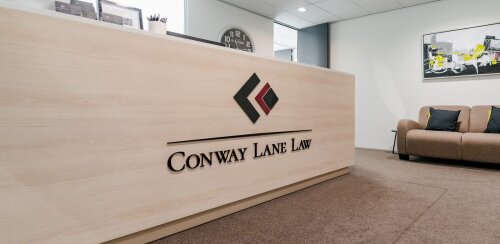Best Real Estate Due Diligence Lawyers in Rangiora
Share your needs with us, get contacted by law firms.
Free. Takes 2 min.
Free Guide to Hiring a Real Estate Lawyer
List of the best lawyers in Rangiora, New Zealand
About Real Estate Due Diligence Law in Rangiora, New Zealand
Rangiora residents typically undertake real estate transactions through Canterbury’s regional and district frameworks. Real estate due diligence involves checking property facts before purchase to avoid hidden issues after settlement. In New Zealand, this process is grounded in national statutes and local council practices, with a strong emphasis on title integrity, consent status, and planning compliance. A thorough due diligence review helps buyers assess risk and negotiate price or conditions accordingly.
Key components usually include a title search, a Land Information Memorandum (LIM) check, building consent and code compliance status, and local planning considerations such as zoning and protected hazards. Because Rangiora sits in the Waimakariri District, local rules from the district council also shape building permits, compliance certs, and resource consent requirements. These checks are designed to protect buyers from unknown encumbrances, unpermitted work, or restrictive covenants on the land.
In New Zealand, property transfers rely on formal title verification and local records to establish what a buyer actually receives. Typical due diligence touches on title, LIM information, building and resource consents, and zoning rules.Land Transfer Act 1952
Legal guidance from qualified professionals helps interpret these complex documents and coordinate with local authorities. A solicitor or conveyancer provides procedural clarity, ensures compliance with statutory duties, and helps negotiate protective conditions into the sale and purchase agreement. In Rangiora, local counsel often collaborates with the Real Estate Agents Authority when dealing with agents and routine disclosures.
Why You May Need a Lawyer
- Unclear title or encumbrances: You learn the title shows an easement benefiting a neighbor, or a caveat affecting use of the land. A lawyer reviews the title, encumbrances, and any unregistered interests to determine enforceability and risk.
- Unpermitted work discovered on pre purchase checks: A garage extension exists without a Building Consent and no Code Compliance Certificate (CCC). Legal counsel assesses remedies, potential penalties, and negotiation options with the seller.
- Substantial planning or zoning constraints: The property sits near a floodplain or in a zone with restrictive development rules under the Regional or District Plan. A solicitor clarifies permitted uses, consents needed, and timing for any intended improvements.
- Outstanding rates or charges tied to the property: Rates arrears or special charges surface in the LIM. A lawyer helps negotiate who pays, and whether these amounts affect your ability to settle or refinance.
- Complex tenancy or multi-occupancy arrangements: A property has existing tenancies or shared facilities requiring careful review of lease terms, service charges, and enforceable covenants. Legal counsel ensures disclosure is complete and compliant with NZ law.
Local Laws Overview
- Building Act 2004 - Governs building work, building consents and Code Compliance Certificates in New Zealand. It provides the framework for how renovations and new structures must be approved and inspected. (Effective since 2005; amended periodically to address compliance and safety concerns) Legislation page
- Land Transfer Act 1952 - Establishes the regime for registering titles and ensuring clear transfer of land ownership. A title search under this Act is a core due diligence step in real estate transactions. Legislation page
- Resource Management Act 1991 - Sets out planning, consent and environmental controls for land use and development. It has been subject to significant reforms and policy developments in the 2020s to address urban development and housing supply. Legislation page
Note: National and regional policy updates, like the National Policy Statement on Urban Development, influence Canterbury planning settings and can affect due diligence assessments. Ministry for the Environment - Local Government Act 2002 - Governs local authority planning, policy development, and charges affecting district planning and building control. This Act provides the basis for local records and consistency in approvals managed by councils such as Waimakariri District Council. Legislation page
Frequently Asked Questions
What is a LIM and why do I need it?
A LIM is a local authority report detailing land information, including rates, consents, and hazards. It helps buyers assess property limits and risks before settlement.
How do I order a title search for a Rangiora property?
A title search can be requested through a solicitor or conveyancer who accesses NZ Registers. It confirms ownership, restrictions, and encumbrances on title.
When should I hire a lawyer during a property purchase?
Engage a lawyer before signing a sale agreement if you anticipate complex titles, covenants, or planning issues. Early engagement helps protect negotiation leverage.
Where can I check if building work has CCC status?
Check the Building Consent records with the local council or through your solicitor who reviews the Building Consent and CCC for the property.
Why might I need a resource consent check in Rangiora?
Resource consents determine whether land use and developments comply with district and regional plans. They are essential for property in urban fringe zones.
Do I need to worry about earthquake prone status?
Earthquake risk assessments may affect certain building components. A lawyer can explain implications for insurance, repairs, and sale negotiations.
Should I order a LIM before making an offer?
Yes. A LIM can reveal issues that affect value, such as outstanding permits or disputes, enabling informed offers or conditional clauses.
Do I need to involve a solicitor or a conveyancer?
Conveyancers handle standard property transfers, while solicitors manage complex matters like title disputes, leases, or regulatory compliance.
Is the cost of due diligence predictable?
Costs vary by property complexity and professional fees. Typical NZ legal fees can range from a few hundred to several thousand dollars, depending on scope.
What is the timeline for due diligence in a normal Rangiora sale?
Expect 1-2 weeks for initial checks, with longer periods if issues arise or if complex titles are involved.
Should I compare multiple lawyers for due diligence?
Yes. Compare experience in Canterbury, response times, and communication style to ensure smooth collaboration during the transaction.
Additional Resources
- Legislation and official texts: Legislation NZ - official NZ government site hosting Acts and statutory instruments including Building Act and Land Transfer Act.
- Title and LIM information: LINZ LIM information - government guidance on LIMs and how they relate to property records.
- Local authority records and LIMs (Waimakariri District Council): Waimakariri District Council - official site for building consents, LIMs, and rates information affecting Rangiora properties.
- Real estate agents regulation: Real Estate Agents Authority - oversight of real estate agents, consumer protections, and professional standards in NZ.
Next Steps
- Define your property goals and budget - decide on preferred locality, distance to amenities, and maximum purchase price within 2-3 days.
- Choose your legal approach - decide between a solicitor or conveyancer based on property complexity and your risk tolerance within 1-2 days.
- Gather key documents - obtain current title, LIM, any existing building permits, and consent records from the seller or agent within 5-7 days.
- Engage a Canterbury-based lawyer or conveyancer - interview 2-3 candidates, focusing on experience with Rangiora properties, response time, and transparent fees within 1-2 weeks.
- Conduct a comprehensive due diligence review - your lawyer reviews title, LIM, consents, covenants, and planning restrictions, and identifies potential risks over 2-4 weeks.
- Receive a due diligence report and negotiate - discuss issues, propose conditions or price adjustments, and decide whether to proceed within 1-2 weeks.
- Proceed to settlement with protective conditions - incorporate consent and disclosure conditions into the sale and purchase agreement and finalize settlement timelines within 1 week.
Lawzana helps you find the best lawyers and law firms in Rangiora through a curated and pre-screened list of qualified legal professionals. Our platform offers rankings and detailed profiles of attorneys and law firms, allowing you to compare based on practice areas, including Real Estate Due Diligence, experience, and client feedback.
Each profile includes a description of the firm's areas of practice, client reviews, team members and partners, year of establishment, spoken languages, office locations, contact information, social media presence, and any published articles or resources. Most firms on our platform speak English and are experienced in both local and international legal matters.
Get a quote from top-rated law firms in Rangiora, New Zealand — quickly, securely, and without unnecessary hassle.
Disclaimer:
The information provided on this page is for general informational purposes only and does not constitute legal advice. While we strive to ensure the accuracy and relevance of the content, legal information may change over time, and interpretations of the law can vary. You should always consult with a qualified legal professional for advice specific to your situation.
We disclaim all liability for actions taken or not taken based on the content of this page. If you believe any information is incorrect or outdated, please contact us, and we will review and update it where appropriate.









